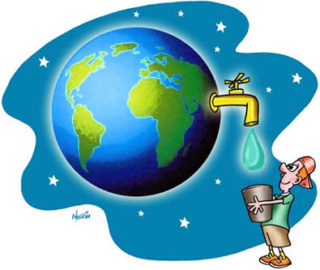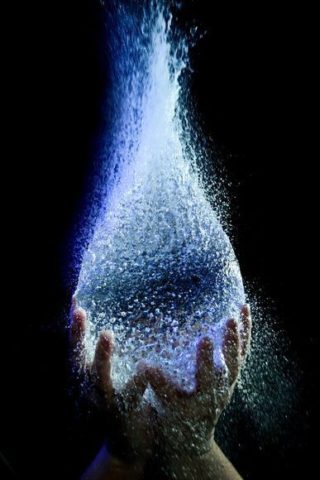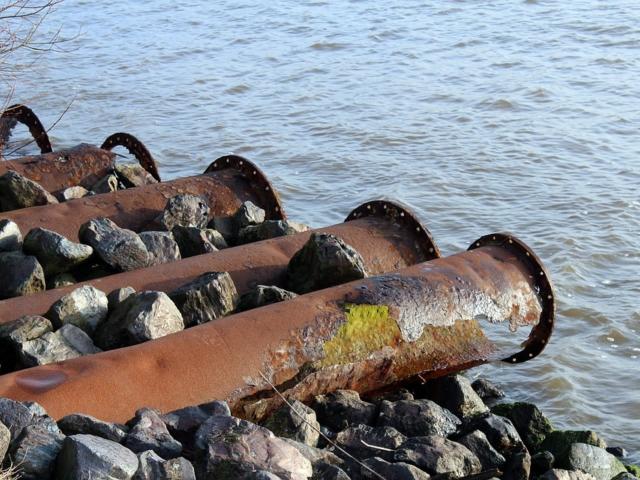Water, vital liquid for the survival of humanity, 60% of our body is composed of water, and is that each of the activities we perform in our daily lives demand this precious natural resource. Which is threatened as the days progress due to the increase in population worldwide. Finding the balance between society and this resource would generate a radical change before the problems that have been manifesting in recent years.
The water source of life, called by many today as "blue gold". Nieto in his article published in the magazine Scielo, entitled "Water management: global and Latin American tensions", points out that in Latin America several countries are having difficulties to have access to drinking water, accentuating in this way inequality in society . It also notes that countries such as Argentina and Uruguay have problems for the enjoyment of this resource, since the costs of payment for this service are excessively high, reaching the point of having to sell their homes to settle the bill for the consumption of this vital liquid , otherwise they would have to expose themselves to legal actions, bringing with them that sectors of lower economic resources can not access this right.
Nieto highlights that Latin America needs wastewater treatment systems, since we have an 88% deficit, a very high value which causes drinking water levels to decrease progressively, contaminating rivers and seas, another factor that influences is the lack of awareness on the part of the population for the rational use of this resource. Each country in Latin America and the world have their own laws and regulations for per capita supply, there are countries where their water levels are very low reaching 4.5 liters per person per day, in another 250 liters per person per day , due to the accessibility and availability of the water resource.
Undoubtedly agriculture is an activity that requires large amounts of water for their crops, according to data from the Food and Agriculture Organization of the United Nations (FAO) the total annual water extraction for South America, Central America and the The Caribbean is 245.27 billion cubic meters, which corresponds to 6.3% of the world extractions. Of the totality of this extraction, 71% of the water is used for agricultural purposes, being a very high level for the production of food.
The United Nations (UN) says that more than 1.5 million children, mostly under the age of five, die every year in developing countries, because of the shortage of drinking water and sanitation, the water contaminated with agents pathogens, generate diseases such as diarrhea, the main cause of infant mortality. Polluted water and lack of sanitation have been an obstacle to eradicating extreme poverty and diseases in the poorest countries. Not having the installation of sanitation systems such as bathrooms and latrines, are causing problems for humanity, more than 2.3 billion people do not have this service worldwide.
According to the Joint WHO / UNICEF Program for Monitoring Water Supply and Sanitation, it shows statistics that at least 1.8 billion people around the world drink water that is not protected against the contamination of feces; that is, waters that do not have any type of treatment to make it suitable for human consumption. It also makes reference that an even greater number drinks water that is distributed through systems vulnerable to contamination.
In countries like Mexico and the United States they sign agreements to have access to the vital liquid, which allows them to make use of their border waters from the Treaty of Limits and Water, signed in 1944. Other factors that are affecting availability of this resource is climate change, which is taken hand in hand as a result of human activities among which are mentioned: deforestation, burning, air pollution, soil contamination, and even pollution of the same waters.
All this problem is on alert to the entire world, so governmental and non-governmental organizations are working to maintain this precious natural resource for a long time, changing statistics that mention the lack of it in a few decades.
Let's start by mentioning UNESCO, in which it expresses through report that the solution to water scarcity is Green Infrastructures, taking as an example China with its project "sponge cities", which proposes to recycle 70% of rainwater through more permeable floors. They also mention the "rice intensification system", an idea that arises in Madagascar, with the purpose of renewing the soils using new seeds and chemical products. With these proposals UNESCO estimates savings between 25% and 50% of water.
Similarly we find the UN, which works together with countries and organizations to achieve the Sustainable Development Goals, in particular the number 6 regarding clean water and sanitation. It should be noted that a group composed of eleven heads of state and a special water adviser and co-chaired by the president of Mexico, Enrique Peña Nieto, delivered a report entitled "Let each drop count: An Agenda for Water Action"To the Secretary General of the UN, in which within their recommendations they state: create a shared database among different countries to, for example, better manage the shared water basins. "Mexico is a clear example. We share the border and watershed with the United States, both on the Rio Bravo and the Colorado River, "so that their experiences serve as recommendations for other countries.
Japan is currently working on fundraising to help generate wastewater treatment systems in Latin America through the water bonus program, according to information provided by ComunicaRSE "this type of thematic bonds are fundamental to promote the development of projects that improve water quality." well-being of the population Despite having more than a third of the planet's freshwater resources, Latin America faces the challenge of universalizing the supply of potable water, meeting the increase in demand due to high rates of urbanization and the best standards of life for the population, in addition to the growth of various productive activities such as agriculture for export and services linked to tourism, "said Enrique García, CEO of CAF - Development Bank of Latin America.
It is inadmissible that we waste water unnecessarily. Small measures in your daily life will help a lot in saving and contributing to a better distribution of drinking water. Be part of the change that Life in this World needs.
Bibliografía
- Bolivia vs. Chile, escasez de agua... Las noticias del lunes, (19 de Marzo, 2018). Recuperado de: https://news.un.org/es/story/2018/03/1429332
- Colocan “Bonos de Agua” para el desarrollo de América Latina, (31de Enero, 2017). Recuperado de:http://www.comunicarseweb.com....
- Nieto, Nubia. La gestión del agua: tensiones globales y latinoamericanas. (Enero, 2011).Recuperado de:http://www.scielo.org.mx/sciel... Once líderes mundiales alertan sobre la crisis del agua: cada gota cuenta, (14 de Marzo, 2018).Recuperado de: https://news.un.org/es/story/2018/03/1429092
Lorem ipsum dolor sit amet, consectetur adipiscing elit, sed do eiusmod tempor incididunt USD1686526669 ut labore et dolore magna aliqua. Ut enim ad minim veniam, quis nostrud exercitation ullamco laboris nisi ut aliquip ex ea commodo consequat.



